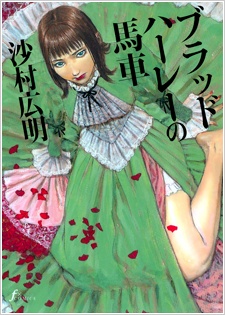Bradherley's Coach

I've had this manga on my plan to read for an incredibly long time now, and from what I can tell I think it's because it was published in one of my favourite magazines, Manga Erotics F. On top of that, the story and art is done by Hiroaki Samura, most known for Blade of the Immortal. Boti is actually the first seinen manga I've ever been exposed to, and the first time I encountered the term seinen too. I never read it fully, but it was being published in my native language all the way back in like 2008 and a kids/teen magazine I was obsessed with at the time came with a free copy of the first chapter of Blade of the Immortal, Sugar Sugar Rune and Negima, which is how I came into contact with it. Anyway, I read a different work of his, called Gensou Gynaecocracy, a while back... and I found it a bit incomprehensible at times.
Maybe I was expecting the same from this work as well, but actually it was pretty readable, despite each chapter dealing with different characters at different points in time in the same setting.
This manga starts with two incredibly disturbing chapters that, if it had continued in the same vein I would have probably stopped reading because it's verging on torture porn and that kind of stuff gets tiring quickly sometimes if I'm not 100% up for an eroguro extravaganza. Consider that before reading. Even though it's not excessively graphic, the subject matter is incredibly depressing.
In here I will talk about the story and some of the themes it explores, I will only spoil the first two chapters
The story begins with young girls in an orphanage hoping to be chosen as the next adoptive daughters of the Bradherley family, a mysterious and extremely rich family that has its own opera troupe, which the orphans watch perform once a year and hope to one day be a part of it, as all the women performing in the troupe are actually former orphans.We follow one freshly adopted girl as she gets chosen to be a part of the Bradherley family and instead of getting taken to the family home she gets taken to a jail. And this is where the disturbing stuff comes in... Most young girls that get adopted don't get to be a part of the opera troupe, they're instead prostituted to the prisoners, well not even prostituted, more like thrown like a piece of meat into a den of hungry wolves, and many of them do not live more than a couple of days.
The reasoning behind this lies in a violent jailbreak riot that happened about a decade ago. To prevent further jailbreaks and keep the prisoners "happy", the government decided to use orphaned girls that nobody would miss as sacrifice for a yearly "festival" in which the life sentence prisoners partake in. The Bradherley family thing is basically just a coverup and the family gets to profit from it some way or other.
Frankly, this subject matter was very hard for me to get through, because even though exaggerated here, it's something people unironically wish for and advocate for in real life. Prostitution is usually defended in this manner - as a way to keep the dangerous and "pent up" men happy, we use women as a buffer zone. They absorb all the violence and evil, and in return we get a happy society with less rape. We have incels unironically advocating for state mandated gfs (at this point a meme, but it doesn't change the fact that a lot of men feel like they're owned a fuckdoll in the form of a real human) and so on.
I felt like this work managed to portray these above mentioned ideas as something that is in fact deplorable, by using a more black and white system of men with a life sentence vs women that are young and hopeful. Honestly the author might not have had this intention in the slightest, but this is the first thing that crossed my mind as soon as I read the first chapter.
I liked the premise and the general story direction, but I wish it had about a volume more so that the actual plot could get developed further. The politics side of it actually seemed intriguing, but it felt like it was cut short. All in all it feels incomplete in some way, and judging by the author's notes at the end, I think his heart wasn't fully into this work.
